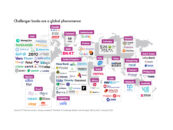
How TikTok’s Owners Are Evolving from Your Kid’s Social Media to Becoming Your Bank
by Fintech News Singapore June 22, 2020TikTok’s owner ByteDance is making inroads into fintech as the Chinese tech company is said to be negotiating a tie-up with an investment group linked to Singapore’s Lee business family, according to a Financial Times (FT) report.
The Lees are one of Singapore’s most well-known corporate families, with patriarch Lee Kong Chian known as OCBC Bank’s founding father. The family has a number of businesses including Lee Rubber Group, and several members of the family have ties to government entities.For ByteDance, a partnership with the influential family would give it a boost in credibility, the FT report says.
ByteDance is one of the contenders for a virtual banking license in Singapore. The firm has applied for a wholesale digital banking license, which, if granted, would allow it to serve corporate clients including small and medium-sized enterprises (SMEs). The Lee Group of Companies has clarified to the FT that none of its entities are currently involved in any initiatives related to a digital banking license.
ByteDance had previously explored applying for a virtual banking license in Hong Kong, the FT report says, where regulators have already granted licenses to competitors such as Ant Financial, and Tencent. These operates leading digital banking outfits in mainland China.
ByteDance views places such as Singapore as better opportunities where it’s now seeking to expand its footprint, the FT reports. ByteDance’s digital banking moves in Singapore aren’t the first time the company has shown desire to venture into financial services.
In late 2018, the Chinese tech company filed for several new trademarks including Zijiefu, which roughly translates as BytePay, as well as Qingli Installment and Wuxian Installment, two trademarks that appear to be small loan products, according to a South China Morning Post report. The three trademarks were classified in the business category of insurance and financial services.
Most recently, a Wall Street Journal report unveiled that the company has launched several new apps, including one for financial services, and in May, it co-led a US$6.2 million investment in Lingxi, a Beijing-based startup that applies artificial intelligence (AI) to financial services such as debt collection and insurance sales, according to a TechCrunch report.
Bigtech aspirations
ByteDance is following on the steps of Chinese tech giants Alibaba and Tencent, which have extended their offerings over the years to now encompass various industries and segments ranging from e-commerce and entertainment, to gaming and financial services.
ByteDance is currently testing out a music-streaming service in India and Indonesia, has recently acquired game developers in China, and has set up a new business unit for e-commerce, among its recent initiatives.
ByteDance’s hit social networking app TikTok, which allows users to create short videos and overlay voices or music, has blown up in popularity in the last two years to become one of the world’s most popular social platforms.
In April, TikTok reached 2 billion downloads, accumulating more than 315 million new installs worldwide in Q1’20 alone – a record-breaking quarter for an individual app, according to Sensor Tower Store Intelligence.
Though ByteDance is mostly known for being behind the viral TikTok video app, the company operated more than 20 different apps as of spring 2020, with each of its products being built on the company’s edge in personalization and recommendation.
According to a CB Insights research paper, ByteDance’s recommendation algorithms are actually its secret sauce, and it would be more accurate to refer the company as an AI laboratory rather than a creator of content platforms.
With so many users and so much knowledge about their interests, TikTok’s algorithms are directing people to a host of unexpected topics, including financial topics.
CNBC recently reported, the financial advice community on TikTok has been growing rapidly over the past months as young people are now increasing turning to the video app to weather the recession caused by the COVID-19 pandemic.
As of mid-June, the #investing tag had racked up 278.1 million views, while variations of investing (#investing tips, #realestateinvesting and #investing101) added up to millions more.
Featured Image Source: Pixabay





